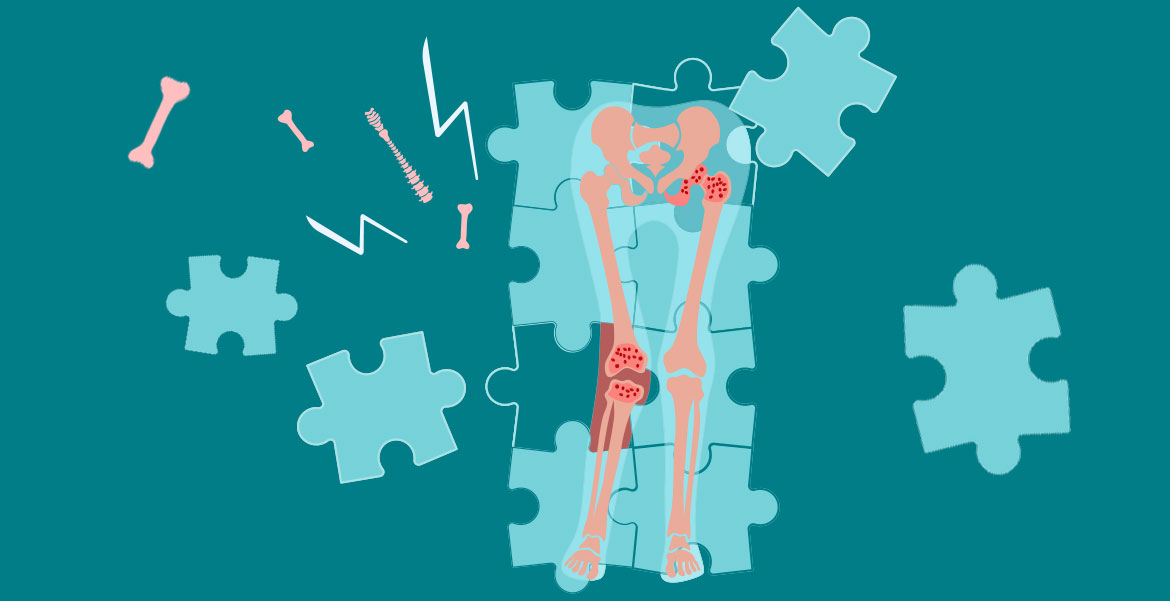Calcium Deficiency
Calcium is one of the important minerals that our body needs in order to bring about vascular contraction and vasodilation, muscle function, nerve transmission, intracellular signaling and hormonal secretion for strong bones and teeth etc.
In our body, serum calcium is very tightly regulated and does not fluctuate with changes in dietary intakes, in fact our body uses bone tissue as a reservoir for, and source of calcium, to maintain constant concentrations of calcium in blood, muscle and intercellular fluids.
What could be the reason for my calcium deficiency?
- Poor calcium intake over a long period of time
- Hypothyroidism or if you have undergone total thyroidectomy
- Vitamin D deficiency
- Certain medications that might decrease calcium absorption
- Decline of hormone estrogen in women
- Malnutrition/ mal-absorption of food
- Certain genetic factors
- Kidney failure
Symptoms of calcium deficiency:
Some of the primary symptoms of hypocalcaemia include irritability, muscle twitching, jitters, tremors, lethargy and seizures.
Chronic calcium deficiency can result in-
- Rickets
- Osteoporosis and osteopenia
- Disruptions in the metabolic rate and normal function of other bodily processes.
- Other symptoms include- chest pains, numbness in fingers and toes, muscle cramps, brittle nails, dry skin, and tooth decay.
How to treat calcium deficiency?
Include calcium rich foods:
- Nuts and seeds (soaked/ roasted)
- Cheese
- Yogurt
- Eggs
- Milk
- Pulses and legumes (cooked)
- Green leafy veggies (cooked)- like spinach, kale, broccoli, drumstick leaves and bokchoy
- Soybean (cooked)
- Figs
Vitamin D rich foods:
Cheese, egg yolk, oily fish and mushroom.
Factors that improve calcium absorption:
| Improve calcium absorption | Decrease calcium absorption |
|
Vitamin D High protein intake Acidic environment in the stomach Exercise |
Excessive consumption of coffee and tea High salt intake Aerated drinks (excess phosphorus) Stress Lack of Vitamin D Phytic acid (present in the whole grains and legumes. The content of phytic acid reduces when you soak or cook the grains/ legumes/ pulses)
|
You can also consider taking supplements after consulting with your health care professional
Do not self-treat by taking a lot of calcium supplements. Taking more than the recommended dose without your doctor’s approval can lead to serious issues like kidney stones.
The two main forms of calcium in supplements:
- Carbonate
- Citrate
Calcium carbonate is more commonly available and is the least inexpensive and elemental. Meaning, it is more readily absorbed. Due to its dependence on stomach acid for absorption, calcium carbonate is absorbed most efficiently when taken with food, whereas calcium citrate is absorbed equally well when taken with or without food. Calcium is the other form which is readily absorbed as well.
According to the National Institute of Health, the percentage of calcium absorbed depends on the total amount of elemental calcium consumed at one time, as the amount increases, the percentage absorption decreases. Absorption is highest in doses ≤500 mg. So, for example, one who takes 1,000 mg/day of calcium from supplements might split the dose and take 500 mg at two separate times during the day.
What happens if calcium is excess in my body?
According to the National Institute of Health, excessively high levels of calcium in the blood known as hypercalcemia can cause renal insufficiency, vascular and soft tissue calcification, hypercalciuria (high levels of calcium in the urine) and kidney stones. Although very high calcium intakes have the potential to cause hypercalcemia, it is most commonly associated with primary hyperparathyroidism or malignancy.
Refer https://ods.od.nih.gov/factsheets/Calcium-HealthProfessional/ for further information.
References:
https://ods.od.nih.gov/factsheets/Calcium-HealthProfessional/
Tags: Calcium Deficiency, important, vascular contraction and vasodilation, muscle function, nerve transmission, intracellular signaling and hormonal secretion, strong bones and teeth, Poor calcium intake, Hypothyroidism, total thyroidectomy, Vitamin D deficiency, Decline of hormone estrogen in women, Malnutrition/ mal-absorption of food, Certain genetic factors, Kidney failure, Symptoms of calcium deficiency, hypocalcaemia, Chronic calcium deficiency Rickets, Osteoporosis, chest pains, numbness in fingers and toes, muscle cramps, brittle nails, dry skin, and tooth decay, Include calcium rich foods, Nuts and seeds (soaked/ roasted), Cheese, Yogurt, Eggs, Milk, Pulses and legumes (cooked), Green leafy veggies(cooked)- like spinach, kale, broccoli, drumstick leaves, bok choy, Soybean (cooked), Figs, Vitamin D rich foods, Cheese, egg yolk, oily fish, mushroom, Factors that improve calcium absorption, The two main forms of calcium in supplements, Carbonate and Citrate, excess.









